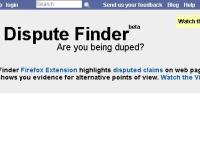Here’s one solution to combating conspiracy theories. Imagine you’re at your computer and you find yourself thinking, hmm, maybe he really isn't a U.S. citizen. And suddenly a hand reaches out of your computer, slaps you on the face and shows you the birth certificate. A new Intel program isn't that exactly, but it’s close. It’s called Dispute Finder, and when downloaded, it scans what you’re looking at online and shows you an article or blog that presents an opposing point of view. It aims to help you to get all sides of a controversial topic, even if you didn't know there was a controversy. It was created by computer scientists at Intel’s Research Lab in Berkeley, California. Rob Ennals is one of the scientists there. He says Dispute Finder doesn't bombard you with every differing opinion on every single disputed subject. Rather, it chooses its topics and sources carefully.
ROB ENNALS: Our intention isn't to tell you if everything is disputed but more to tell you those things where the alternative point of view is backed by a source that you'd be likely to trust.
BOB GARFIELD: So how is it customized for me in particular to have some sense of what sources I might trust or what sources I might consider lacking credibility?
ROB ENNALS: So the moment — this isn't in the current version we're rolling out — when we show you some evidence, you can vote it up or down. So if you believe something is trustworthy from a good source you like to read, you can vote it up, or if you believe it’s from a source you don't particularly trust, you can vote it down. And from that, we can build a model of what kinds of sources you take seriously and want to see.
BOB GARFIELD: How do you avoid the echo chamber effect where you were fed only news in a way that will corroborate your ideology?
ROB ENNALS: That’s a very good question. A lot of what we're trying to do with Dispute Finder is precisely to try and stop the echo chamber effect. But on the other hand, when we tell someone something is disputed, it’s important to present it to them in a way that they will actually take it seriously as actually being disputed. So let's say you’re reading something on something like Fox, and it’s disputed. It’s far better to give you another conservative source to dispute it rather than, say, The New York Times. We definitely want to be showing you the other side’s point of view, but if we just give you other side’s way of writing it, you might be less likely to take it seriously. It’s a delicate balance.
BOB GARFIELD: Is there a semantic Web aspect of this that can actually read and understand the language that it’s scanning?
ROB ENNALS: The current version, everything is marked semi manually. In the version we're going to be rolling out very soon, you train a artificial intelligence algorithm to be able to recognize when a piece of text on the Web is making a particular disputed claim. Once the system is trained, the hope is then it will be able to go across the whole Web and find a large proportion of the places on the Web where that claim is being made.
BOB GARFIELD: Rob, I've got to ask you this. On the video that describes how Dispute Finder works, the voiceover at one point says, oh, and we also have a bull [CUT] detector. How is the bull [CUT] detector an extra feature? The whole thing seems like a bull [CUT] detector to me.
ROB ENNALS: Actually, the bull [CUT] detector is a thing that we're planning to do next. It’s trying to apply the same kind of ideas we're applying to the Web to information you hear in real life. So let's say you’re in a conversation with somebody and they tell you something which is disputed. The device is going to buzz in your pocket and let you know that you just heard something disputed [BOB LAUGHS] and perhaps you should question it.
BOB GARFIELD: So if I'm listening to Rush Limbaugh or, let’s just say, at Thanksgiving dinner, the thing’s going to buzz right out of my pocket.
ROB ENNALS: Yes. In fact, Rush Limbaugh will come earlier. So another thing we're planning to do before the bull [CUT] detector — we want to apply this to closed caption TV text; that if some pundit on TV says something disputed, a thing will flash up at the bottom of your screen saying, this is a disputed claim. This source you trust disagreed with some of this.
BOB GARFIELD: [LAUGHS] Rob, thank you so much.
ROB ENNALS: Thank you.
BOB GARFIELD: Rob Ennals is a research scientist at Intel’s Research Lab in Berkeley, California, where he’s developed the Dispute Finder.
[MUSIC UP AND UNDER] This is On the Media from NPR.

